Hong Kong protests: If Hong Kong leader CY Leung agreed to an interview...
- Published
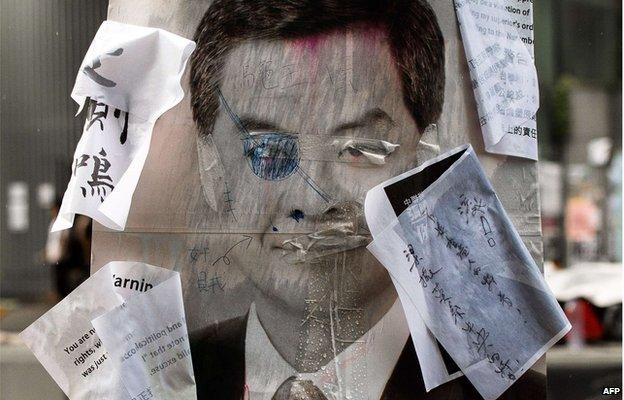
CY Leung is called "689" by the protesters in reference to the number of votes cast to elect him
We've put in many bids to interview Hong Kong Chief Executive CY Leung but our requests have been ignored. Given the chance, I'd ask these three questions.
My first question would be: Why do they hate you so much?
If CY Leung was being straight with me, he might say that it is impossible to be both Beijing's man and Hong Kong's man and that the Chinese communist party is a jealous god.
He'd say that legitimacy in Hong Kong would make him suspect in China because it would mean real local power and the communist party would see that as a threat. If this was his answer, I'd broadly agree.
The prevailing politics of Beijing is you're either with us or against us.
The problem is that this has made him nothing more than a number to many of his citizens. They call him 689. Why? Because he was elected with just 689 votes from a committee of 1,200 - which Beijing controls.
And changing that system to allow all Hong Kong's citizens a free vote for their leader is what the protest has been all about.
So my second question to Hong Kong's leader is why choose Beijing? Why not stand up for your citizens?
I think I know how he'd answer that question, too. If we were talking off the record, he'd say he had no choice.
During the negotiations for Hong Kong's handover in the early 1980s, China's then-leader Deng Xiaoping told British Prime Minister Margaret Thatcher that taking Hong Kong was an afternoon's work for the People's Liberation Army (PLA).
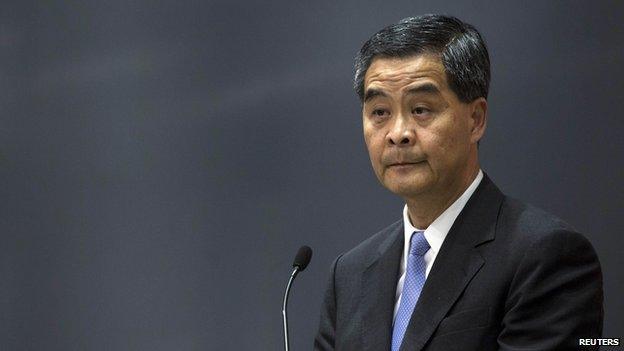
CY Leung, a self-made man, was educated in the UK before returning to work in Hong Kong
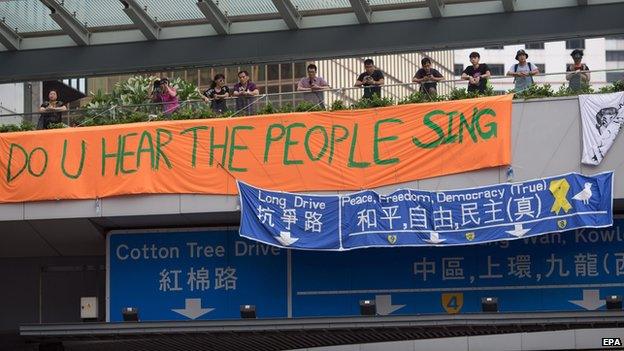
The "Occupy Central" movement have blocked off areas in Hong Kong's financial districts
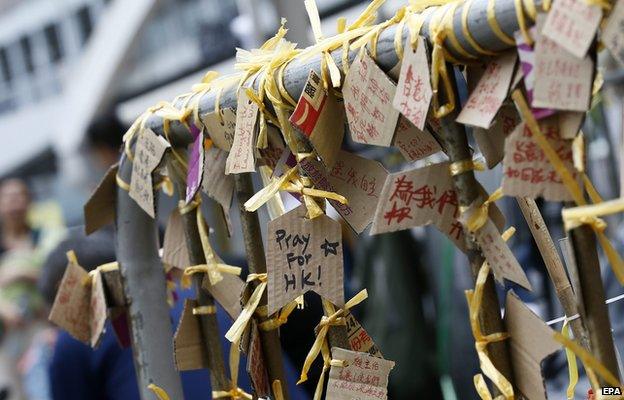
Protesters have written prayers on cardboard, and messages on sticky notes, and painted slogans on umbrellas
Now, the PLA headquarters in Hong Kong are right next door to the chief executive's office. If they want to remove him, China's generals can walk to the window and beckon.
On second thoughts, his answer might be different. He might say he chooses China because that's what he believes in.
He may have been educated in the UK and served as a go-between for Britain and China before the handover, but many suspect him of being a closet member of the Chinese communist party. And there are aspects of his career which suggest that he picked the winning side long ago.
But there's winning and winning. Every politician must surely prefer soft power to tear gas. CY Leung came into office two years ago saying he was going to rule for the people.
And unlike previous chief executives and colonial governors, he is of the people. His father was a policeman. So as he looks down from his office window onto police barricades protecting him from thousands of defiant students, he must wonder whether this could have been avoided.
All over the city centre, there are posters which read "Down with 689". A bus at one of the protest sites has been named "Route 689, Destination Hell".
And as night falls and the main thoroughfare fills with demonstrators lighting up their mobile phones like an endless shoal of silver glow fish, a giant effigy of Mr Leung often appears, swaying above the crowd.
So to my third question: Did you warn Beijing that this would happen?
I'm really interested in the answer to this. It holds implications not just for Hong Kong but for political power on the mainland.
If the answer is yes, that Mr Leung did warn Beijing, then China's president Xi Jinping, who takes all key decisions, must have decided to show Hong Kong who is boss.
If Mr Leung didn't warn Beijing, then he proved the demonstrators point that someone chosen by a tiny, elite coterie answerable to a one-party state is not in a position to represent his public.
He'll always be accountable to Beijing rather than the people of Hong Kong.
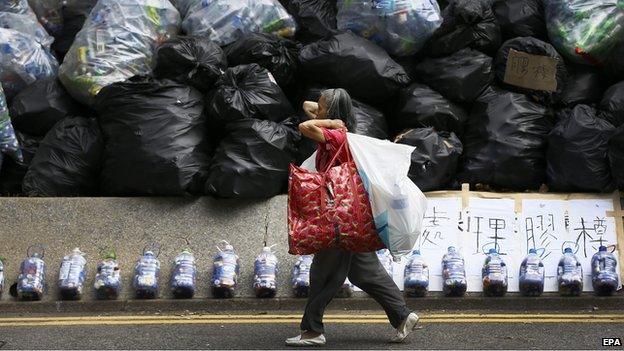
Diligent protesters cleaned up after themselves
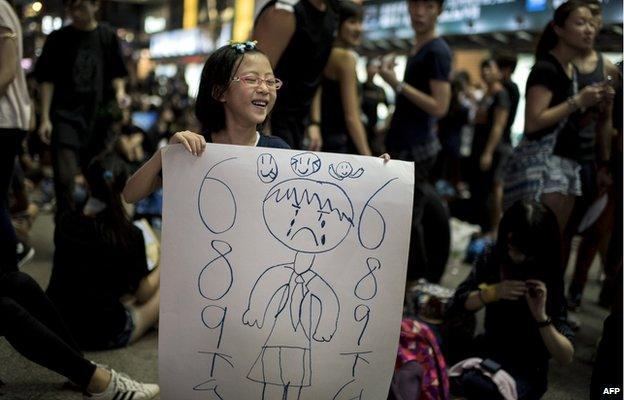
CY Leung is called "689" by the protesters in reference to the number of votes by which he was elected
And at the end of this imaginary interview, as I pack away my microphone, there's one thing I want to say to Hong Kong's leader.
As a British citizen who lives in China, my experience of the past week has convinced me that his citizens combine some of the best of both cultures.
I've watched this crowd cope patiently with tear gas, torrential rain and tropical heat. Many have slept on the road and then got up to scrub graffiti off pavements and sort out recycling.
I've seen them heckled and spat at and even physically assaulted. And they just kept telling each other to stay calm.
China's state media thunders about extremists trying to undermine Beijing's rule. But as far as I can see, the demonstrators are not anti-China. They are just asking for the rights and freedoms they believe they were promised.
So in his heart of hearts, does Mr Leung think they're ready for democracy? Perhaps he'll return my call in the days ahead and I can ask him directly.
How to listen to From Our Own Correspondent, external:
BBC Radio 4: Saturdays at 11:30
Listen online or download the podcast.
BBC World Service: Short editions Monday-Friday - see World Service programme schedule.
Subscribe to the BBC News Magazine's email newsletter to get articles sent to your inbox.